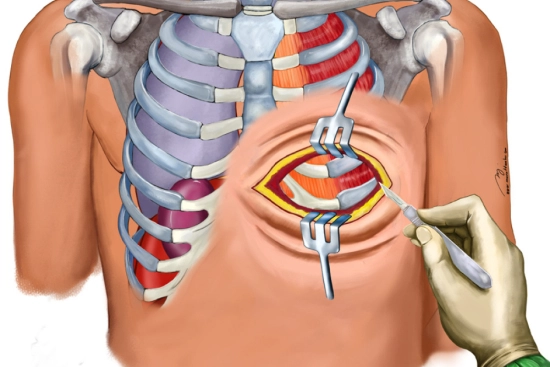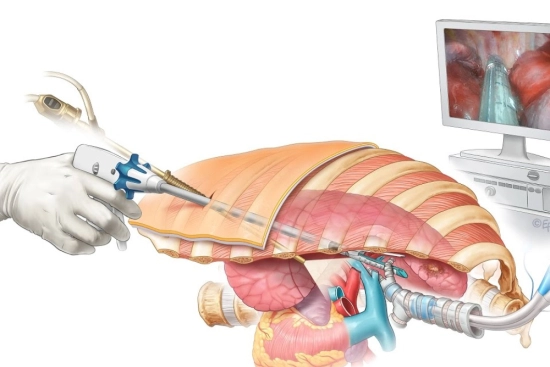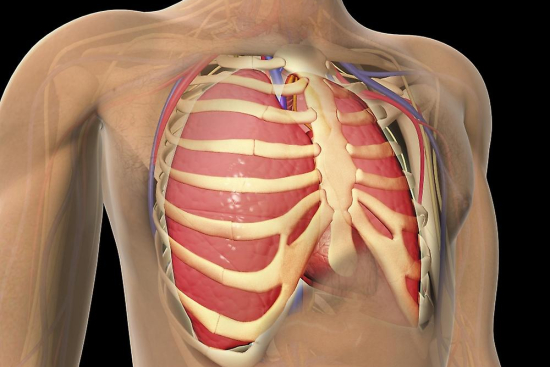Thoracic surgery is a medical specialty that deals with the diagnosis and surgical treatment of diseases of the organs located in the thorax, with the exception of the heart and large vessels, which are the responsibility of cardiothoracic surgery.
The thorax, the anatomical region between the neck and abdomen, contains the lungs, bronchi, trachea, esophagus, mediastinum (the space between the two lungs),and diaphragm.
- Complications related to anesthesia.
- Infections.
- Bleeding.
- Blood clots.
- Pulmonary complications.
- Organ damage.
- Depending on the type of surgery.
Personalized, cost-effective care in Turkey!
Patients undergoing thoracic surgery at our partner hospitals in Turkey will receive the highest level of care, both in and out of the operating room.
Our dedicated team will guide you every step of the way leading up to your thoracic surgery. With our expertise in the latest minimally invasive techniques, we offer you personalized care in a world-class medical environment for optimal recovery.
Contact us today to evaluate your case and receive the most appropriate treatment at a competitive cost!
Best Clinics with Verified Reviews

- Multispecialized hospital
- 7 operating rooms
- Capacity é of 170 beds

What is thoracic surgery?
Many conditions affecting these organs may require surgical intervention. Thoracic surgeons treat a wide range of conditions, including:
- Lung disorders: lung cancer, chronic obstructive pulmonary disease (COPD),lung infections (tuberculosis, abscesses),pleural disorders (pleurisy, pneumothorax),lung nodules.
- Respiratory tract disorders: stenosis, tumors, swallowing disorders (dysphagia).
- Chest wall disorders: congenital malformations (pectus excavatum, pectus carinatum),trauma.
- Esophageal disorders: esophageal cancer, gastroesophageal reflux, hiatal hernia.
- Mediastinal disorders: tumors, cysts, thymus abnormalities.
Thoracic surgery techniques
Thoracic surgery can be performed using a variety of techniques:
- Open surgery: Traditional procedure that requires a larger incision.
- Minimally invasive surgery: performed through small incisions using special instruments and a camera.
The choice of surgical technique depends on the type and location of the lesion and the patient's overall health.
Common thoracic surgeries
Thoracic surgery offers a wide range of procedures to treat lung and mediastinal pathology. The most common procedures include:
Surgical act | Common procedures |
Lung resections |
|
Biopsies and Diagnostics |
|
Minimally invasive procedures |
|
Other Procedures |
|
This list is not exhaustive and other procedures may be offered in Turkey depending on the specific needs of each patient.
The preoperative phase of thoracic surgery
Before thoracic surgery, several tests are usually done to assess your health and prepare you for the procedure.
These tests may vary depending on the exact nature of your problem. They often include:
- Blood tests to assess your general condition and detect any abnormalities.
- Imaging tests (X-rays, scans, MRIs) to visualize the organs in your chest and help locate the area to be operated on.
- Cardiac function tests (ECG, echocardiography) if your heart is involved.
- Respiratory function tests (spirometry) to assess the capacity of your lungs.
- Biopsies (tissue samples) to make a more accurate diagnosis.
Sometimes more specific tests are needed, such as exercise or walking tests.
These tests allow the surgeon to tailor the procedure to your situation and minimize risks. Once all the results have been analyzed, a detailed surgical plan can be drawn up.
Together with Turquie Santé, we will define the best treatment plan to help you regain your shape and well-being as quickly as possible.

The surgical procedure
After you are put to sleep with anesthesia, you will be intubated to help you breathe. Depending on the complexity of the surgery, a machine may take over your heart and lungs.
Your surgeon will make either a traditional incision (for example, through the breastbone or between the ribs) or a less invasive one (with smaller incisions).
The goal of surgery is to:
- Repair damaged tissue.
- Remove the diseased part (tumor, infected tissue, etc.).
- Replace an organ or part of an organ (transplant).
When the surgery is complete, the surgeon will check for bleeding and close the incision.
The benefits of thoracic surgery, such as improved breathing, reduced pain, and improved overall quality of life, generally outweigh the risks. It's important to discuss this in detail with your surgeon in Turkey to make an informed decision.
Recovery phase
Recovery time from thoracic surgery is individual and depends on the type of surgery performed. In general, a one-week hospital stay is common, but minimally invasive techniques can reduce this to three or four days.
Full recovery may take several weeks or even a month. Your surgeon will evaluate your ability to resume your usual activities, such as driving or working, on a case-by-case basis. It is likely that you will need to limit certain physical activities for the first six weeks after surgery.

Risks & warning signs
Thoracic surgery can significantly improve your quality of life, especially if you have breathing problems or chronic pain. However, as with all surgical procedures, there are risks.
The most common risks include:
- Infection (especially pneumonia),which is usually treated with antibiotics.
- A collapsed lung (pneumothorax),which is often treated with a small drain.
- Blood clots, which are prevented by medication and regular exercise.
- Pain after surgery, relieved by painkillers.
Less commonly, complications related to anesthesia may occur, such as:
- Abnormal heart rhythms.
- Breathing problems (pulmonary edema).
Although these complications are possible, they are generally rare and can be effectively treated.
After surgery, it's important to watch for the following signs:
- Severe chest pain.
- Severe shortness of breath.
- Heavy bleeding from the incisions.
- High fever.
- Swelling of the legs or feet.
Do not hesitate to contact your surgeon if you experience any of these symptoms.
Share this page






